
Latitude Craft Chocolate – A Vertically Integrated Social Enterprise
Latitude Craft Chocolate is a sustainable and transparent bean-to-bar chocolate company made at its origin in Uganda.
USA
Ia Yien Lei October14, 2022
Ted Dennard has been captivated by bees ever since he was a child. He first discovered beekeeping through his mentor, Roy Hightower, who brought bees to his family’s forested land and showed him how to pull a frame from the beehive. After graduating with a Philosophy and Religion degree, he worked with beekeepers in Jamaica for the US Peace Corps. Later, he used this experience to teach beekeeping skills to people in Exuma, Bahamas, creating the Exuma Project.
Dennard works closely with beekeepers from around the world who share his passion for sustainability, saving the bees, and saving the planet. He believes the company’s most significant impact is in education. Through their Bee Cause Project, they have provided beehives to over 700 schools across the United States, Canada, the Bahamas, and Puerto Rico introducing children to bees and giving them a hands-on connection with these most significant pollinators. The company also encourages higher education in its communities. They donate the proceeds from their Peace Honey to the Frank Callen Boys & Girls Club, an organization that helps guide local students into college. Savannah Bee Company is helping to save the bees with each jar of honey, bee-powered beauty products, and with its cultivated hives. The company’s interactive retail destinations around the country include Bee Garden Tours, teaching all about honeybees, beekeeping and the impact bees have on our everyday lives.
Dennard strives to live as bees live – symbiotically with nature and in a manner that contributes positively to the world around us.
Mood of Living: Where are you from? Where did you grow up?
Ted Dennard: I grew up on St Simons Island, Georgia, a little island in coastal Georgia.
MoL: Where did you go to school? Did your studies inspire your career path? If so, how?
TD: I went to The University of the South, a smaller college in the mountains of Sewanee, Tennessee. I didn’t want to go there at first, but I ended up loving it. There was so much nature: hiking, rock climbing, waterfalls. It was a great environment to learn and grow. I became kind of a hippie in college. I did yoga, meditated, read books about spiritual enlightenment, and fasted every week.
I actually majored in Philosophy and Religion during my time there. I learned a ton about thought and different perspectives. Bees have been a passion, but I could see how a philosophical approach to business has helped me in ways that probably aren’t taught in business schools- things like using a beehive as a business model where everyone wins. Making decisions that go against financial gain but do build quality and, one could argue, customer loyalty. Pain in the short term but gain in the long term.
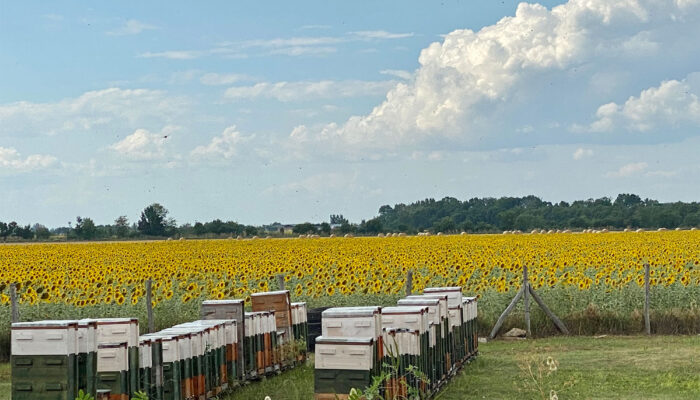
MoL: What sparked your passion for beekeeping? Why did you create a honey company? What or who influenced you?
TD: My first interaction with bees was when I was a boy on my family’s forested land. My parents made a deal with an elderly beekeeper, Roy Hightower: he could put his bees on our land if he taught us about beekeeping. The moment he showed me how to pull a frame from the beehive, I held it against the sun and saw the multicolor honey glistening like stained glass. When I stuck my finger in each different colored section of the comb, each a different variety of honey made from different flowers, I was hooked.
After college, I worked with beekeepers in Jamaica for the US Peace Corps. After all that I ended up using my backyard beehives to start a honey company. So many people have helped me on the way. Really too many to enumerate. ‘It takes a hive’ we like to say and that’s the truth.
MoL: What was the first kind of honey you produced and why? Where were your first beehives located? Where did you first sell your honey?
TD: Good questions. The first honey was backyard honey, but the first Savannah Bee honey was tupelo honey, and I took great pains to make the very best that can be made when those flowers bloomed on the banks of the Altamaha River. The first jars were sold to some friends for Christmas presents and then to local stores in Savannah for them to resell. Tupelo and Sourwood honeys are the best and they can both be made right here in Georgia!
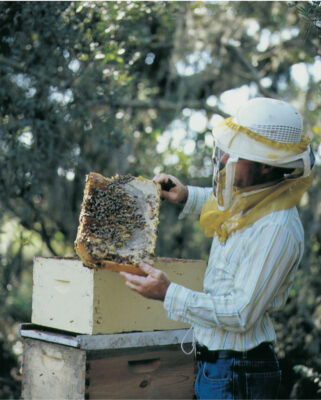
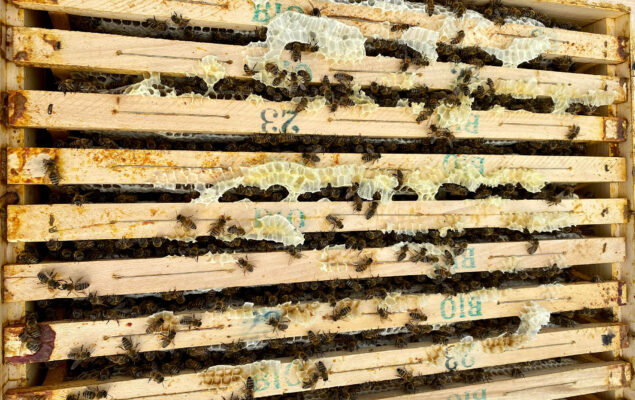
MoL: What were some challenges when you founded Savannah Bee Company? Did you have a business background?
TD: I did not have a business background. In fact, I always thought I hated the way businesspeople acted. I was naive. Business, I have learned can be as creative as any artistic endeavor and with a much greater impact than I as an individual.
The challenges have been manifold – understanding business basics for starters and finding sources of capital for the growth of inventory. I was a religion and philosophy major and had no business background whatsoever. There are likely ways that helped me as well as hurt me.
MoL: Do you work with a variety of beekeepers? If so, where are they located? What are you looking for when you source your beekeepers and manufacturers?
TD: We work with all sorts of different beekeepers, most of whom I actually know by name. They are located all around the world. For example, one of our most recent honeys, Sunflower Honey, was sourced from beekeepers in Romania. We get honey from wherever the best honey of that variety is made. Every species of flowers produces unique nectar for the pollinators and the honeybees take advantage of that, but the honey they make from it has the unique properties that plant species gave it. We look for quality first and foremost and while I get that is so cliche, it is those that take the care, that do actually care that make the good stuff and I can taste it.
MoL: What makes your honey unique? What determines the taste?
TD: I am a little bit of a honey snob. I make sure that all the honey we source has the perfect taste and color, and we never settle for “okay” honey. We have great relationships with beekeepers around the world and have really found the best of the best over the years.
The taste of our varietal honeys is based on the flowers it came from. The plant species has unique tastes and sugar compositions. None of our liquid honeys have added flavorings (except our Hot Honey, which by the way, you have to try). Bees naturally practice flower fidelity. They are loyal to the best source of nectar and do a “waggle dance” to let other bees know where to find it. That is why our tupelo honey has a buttery, bubble gum taste and our acacia honey has a light floral taste. Honey is as different as wine.
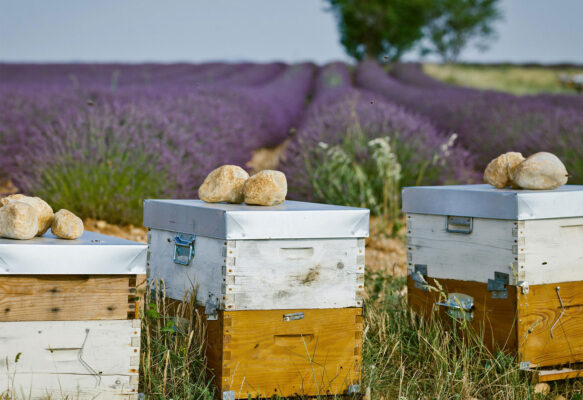
MoL: Since the beginning of your company, you have expanded with retail stores all over the country. What is the process of scaling to such a successful business? How difficult is it to maintain your original purpose-driven mission and quality of products?
TD: Damn good question and one we wrestle with all the time- ‘how do we grow without losing what makes us unique and special?’ The process from the inside point of view is very organic and slow. I’d say we have not really scaled in the way that many companies do. We just keep on growing from the cash flow we generate as well as what the banks will give us in credit. The purpose is easy to keep but the hardest part is maintaining the culture and connection from office to satellite stores 2000 miles away.
MoL What other products do you make? What kind and forms of honey do you utilize in your beauty products? Where do you manufacture your honey products?
TD: We make beauty and wellness products packed with amazing hive ingredients. The main four hive ingredients in our beauty products are honey, beeswax, propolis, and royal jelly in different concentrations.
Honey is antibacterial and antiseptic, so it is excellent for wound care (all you need is a little smear on a gauze of a band-aid. It is also a natural humectant, drawing moisture from the environment into the skin.
Propolis is the hard barrier material that bees use to build and protect hives from the outside world. It fights bacteria, fungi, and viruses, and is an overall super-ingredient for beauty and wellness products. We even make a Propolis throat spray because propolis has been shown to prevent illness naturally.
Royal Jelly is the substance that transforms a worker bee into a queen. It helps her to grow to about twice the size of a worker bee and live up to ten times as long. On the skin, Royal Jelly can promote collagen production and reduce inflammation.
Beeswax comes from the honeycomb, and it is an excellent moisturizer and skin protectant. We put a lot of thought and research into all our beauty products. They are not just a fun gimmick, there is the science that backs up all our ingredients. Originally, I made most of the beauty products in crockpots in little warehouses before finding companies that could take the formula and make it at scale better than I could.
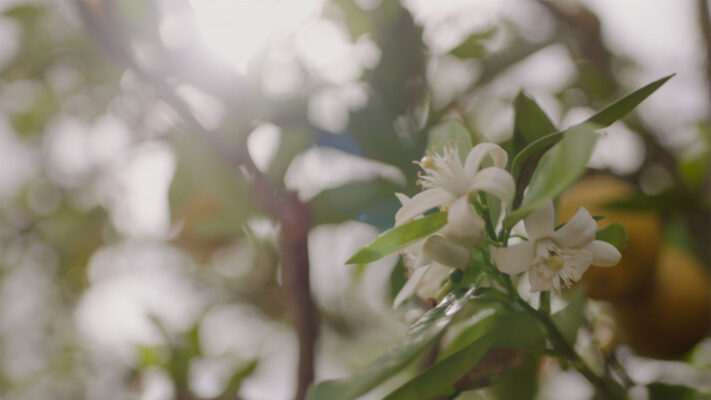
MoL: How do beekeepers ensure that bees are pollinating with non-toxic flowers? How do you ensure that the honey you produce is good for one’s health? What determines high-quality honey?
TD: All of the honey sourced is third-party tested for common pesticides and bee treatment agents such as varroacides (treatments for mites). We also do a full microbial panel to make sure all of our products are one hundred percent safe.
Before it gets to you, each barrel of honey goes through a full sugar spectrum analysis to ensure that it is not adulterated. A lot of grocery store honeys are cut with corn syrup or enhanced with table sugar, but ours are always pure honey. This ensures that you get not only the best taste but also the full health benefits.
We also have very good relationships built over a couple of decades and we stick with the beekeepers that do a great job year after year.
MoL: What inspired you to create your Save the Bees Projects? How are these projects helping people and the planet?
TD: We have a few mission-based projects. The first is the Bee Cause Project, which aims to put observation hives in schools and teach the next generation about the importance of bees. Tami Enright and I began the project in 2013, and since then, we have been able to put beehives in over 700 schools across the United States, Canada, the Bahamas, and Puerto Rico.
We also have our project in Exuma, Bahamas. Exuma had zero honeybees for years. None. We were able to take 12 hives to the island and train 15 beekeepers to sustain the population. We’ve also pledged a 10,000 dollar grant to those same beekeepers to provide them with the equipment they need to grow. This not only helps the bees, but it also gives the beekeepers a source of sustainable economic growth and a way to support their families.
Here at our Headquarters on Wilmington Island, we have our bee garden and bee therapy hut. Our employees give dozens of bee tours a week to educate the public.
We raise money for the Frank Callen Boys and Girls Club here in Savannah by selling honey with a label saying Peace Honey. We do what we can and usually get overextended with our time commitments on these extra projects.
If you’d like to learn more about our mission, check out https://savannahbee.com/pages/our-story.
MoL: What other sustainable initiatives do you incorporate in your business?
TD: We always try our best to be as sustainable as we can, and we are always striving to do better in this area. We recently started a sustainability committee with members from our different departments. They meet and brainstorm different ways we can improve our environmental impact, from packaging changes to reusable utensils in our break room.
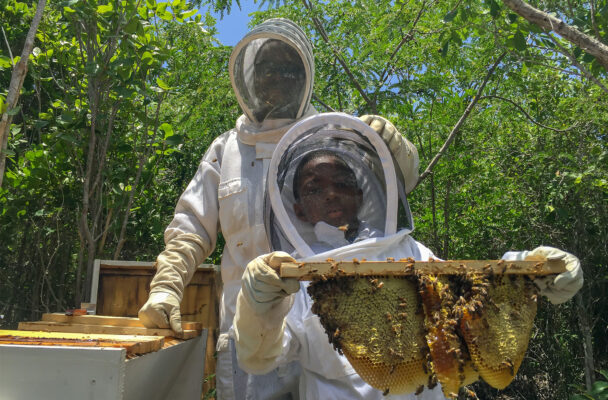
MoL: Why are bees so important to our earth? Why is it important for you to teach the next generation about bees? How and where are you educating people about honeybees, beekeeping, and the impact bees have on our everyday lives and the environment?
TD: Bees are crucial to our survival. Of the crops that are grown around the world – the ones that we eat, feed our livestock, and make up a lot of our other everyday items – 80% require pollination. One hive of bees will visit 500,000,000 flowers per year. Bees are nature’s master gardeners.
We teach the public about bees in lots of ways. All of our retail workers are trained and armed with the knowledge to answer customers’ questions and explain our mission. We sparked the Bee Cause Project to install hives in schools and provide education to kids. The Exuma Project brought bees and beekeeping knowledge to a group of people who never would have known otherwise. We give daily bee tours at our headquarters. Our website and social media pages share important information about our mission. I get out there whenever I can and do talks and speeches about the importance of bees.
I like to think we do a good job of educating people where we can, and we are always looking for ways to expand our reach more.
MoL What are the healthiest types of honey, and why?
TD: Saw Palmetto sticks out to me. It is honey with a strong, smoky taste. Saw Palmetto was compared to Manuka (another popular “wellness” honey) and was found to be up to four times more antimicrobial. Usually, the darker honeys have more minerals so one could argue that they are better for you.
Raw honey has its living enzymes intact so you could say raw honey is the best (not overheated or filtered. Honeycomb is the best example of this,) I think that the sun’s energy gathered by two million flowers that make up just one pound of honey has to deliver something healthy. It’s been shown that beekeepers live longer than any other profession. Also, people eating honey get sick less often and are sick for less duration if so. Support your local beekeeper. But if in doubt, we got you and have done the work of research and care, so you don’t have to.
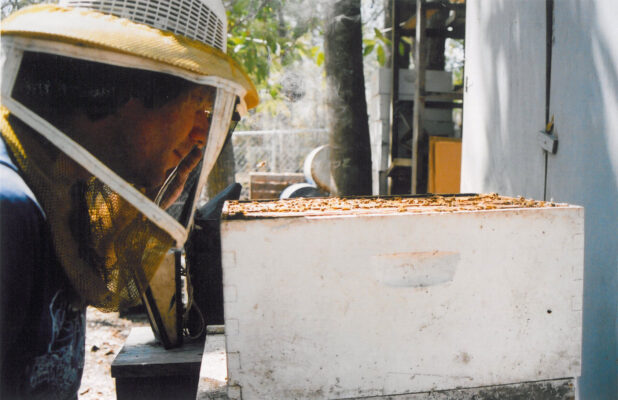
MoL: Do all types of bees make honey? What is the best type of honeybees? What kind of bees do you use for honey-making?
TD: All bees make honey and support themselves by the nectar (honey) and pollen of flowers. But usually, those many thousands of species only make enough for their small group or solitary life underground. There are five species of bee that make a large surplus. Five out of 25,000. We use the western or European honeybee as does most of the world.
MoL: Do bees know they pollinate?
TD: Hmmm. I think they are dialed into the plant world in ways we have no idea of. Don’t get me started. Yes, I would hazard a guess that they know something about the fulfillment of pollination even if it is in an energetic transfer from the satisfied plant. Seriously, sounds crazy but flowers can communicate with bees through static charges, ultraviolet light landing patterns, chemical fragrances, etc.
MoL: What have you learned by creating your own business? Do you have any life lessons you would like to share?
TD: I am a huge advocate for living a symbiotic life in every way possible. You can never be done but you can really help benefit much of what you touch and limit some of the negative impacts you might have without focus and effort to aspire to be honeybee-like.
My three top tips for aspiring business owners are:
MoL: What are some future goals for Savannah Bee Company?
TD: The biggest goal moving forward is to grow our mission in proportion to our sales. We never want to lose sight of our purpose. We use what I like to call a “beehive business model.” We all work together to support one another and the company. Honeybees have outlived the T-Rex, so they must have a sustainable model. We want to benefit the customers with our products, help our employees, and support the bees along the way. Everyone wins.
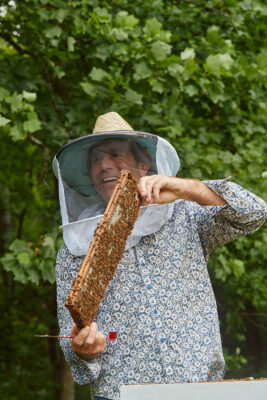
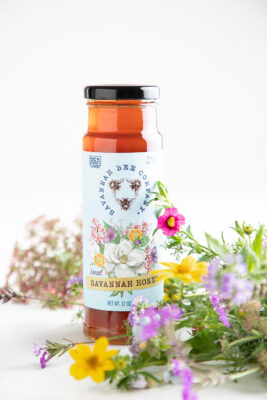
MoL: How can people get involved with a purpose-driven company like yours?
TD: One way you can get involved with us is by signing up for our rewards program on our website or in our stores. When you do that, we adopt a bee on your behalf. We also have honeys that support our different mission projects directly. The Bee Cause honey supports our Bee Cause, and our Peace Honey supports the local Boys and Girls Club and gives back to the community.
Anyone can get involved with our mission by educating themselves about bees and learning how to protect them in their day-to-day life. Plant bee-friendly plants, use organic fertilizers and herbicides, support local beekeepers and hive-friendly companies (like us!), and spread the word. All these small things add up and ultimately help to save the bees!
MoL: Do you live a conscious lifestyle? If so, how?
TD: Well, that is for sure very subjective, but I honestly do work toward being as conscious as possible. I wish it was like a switch that was turned on and stayed on. For me, I have to keep on working and reworking to stay present, and conscious. I was just telling my brother, “You must be present to win!” and he understood I meant not a lottery but the game of life. It is as deep as you can take it. I studied religion and there is time that is linear and time that is more grounded in the depths and then towers into the heavens. That later time is the one that can connect you or a tribe/people to the universal timelessness of the present. Don’t get me started.
Photography courtesy Savannah Bee Company

Latitude Craft Chocolate is a sustainable and transparent bean-to-bar chocolate company made at its origin in Uganda.

Creating an equitable spice trade by disrupting an outdated trade system and putting money and power into the hands of Indian farmers.

Founded by Helen and Mike Cameron, Uncommon Ground is America’s first certified organic rooftop farm.